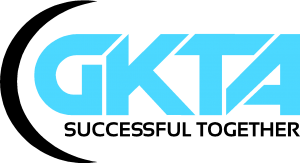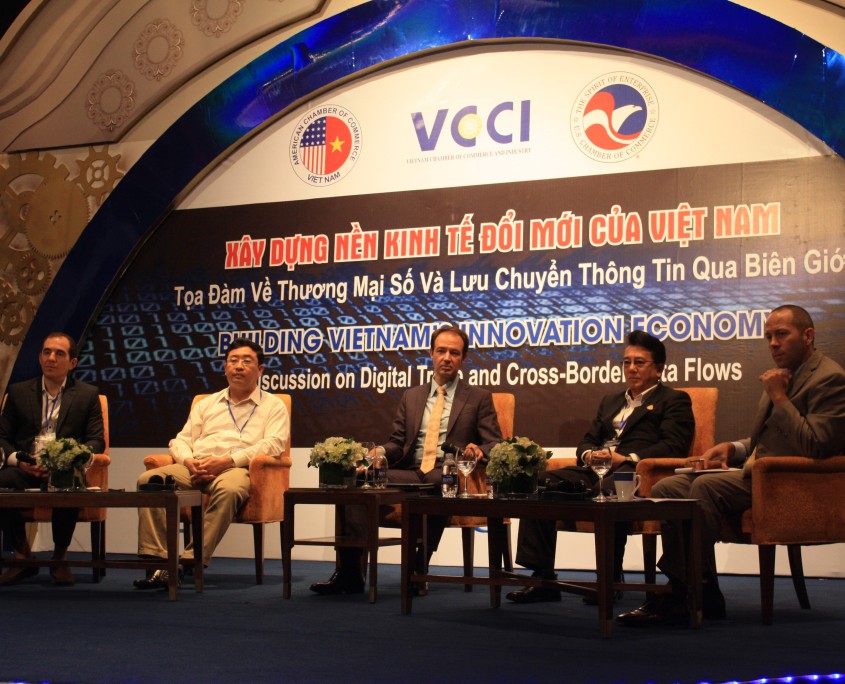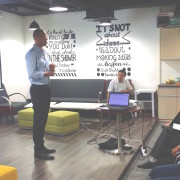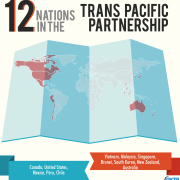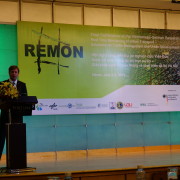Building Vietnam’s Innovation Economy
On May 12, 2015, representatives from Google, Uber, 21st Century Fox, Cisco Systems and other multi-national corporations (MNCs) came together to discuss digital trade and cross-border data flows in Vietnam’s capital city of Hanoi. The event was organized by the American Chamber of Commerce Vietnam, the Vietnam Chamber of Commerce and Industry (VCCI), and the US Chamber of Commerce. Of course, the Trans-Pacific Partnership (TPP) was front and center throughout the daylong event but there were also a series of interesting topics throughout the panel sessions, some of which were named “Building Blocks for Innovation” and “Best Practices for Promoting the Economy and Protecting Consumers.” During these panels, company representatives spoke about attitudes and policies toward operating in Vietnam.
For example, Google’s Country Lead for Public Policy and Government Affairs, Alex Long, shared some insight into the Vietnamese market: there is 300% more language learning content that is consumed on YouTube in Vietnam compared to the average rate globally, showing the strong desire that Vietnamese have for Google’s services. Google has 13 data centers around the world including one in nearby Singapore. Thus, its interests are global so Google seeks to maintain a virtuous cycle where there is more demand for online services, more innovation in online services, more investment in online services, and therefore more online services in general. (In short, Google loves content–both in terms of volume and quality.)
On a local level, activating this “virtuous cycle” can work in a few ways:
- Policy advocacy (through events and working with public sector partners)
- Pilots—increasing access (Project Loon, for example.)
- Peering/caching (allowing locally and regularly-accessed content to be consumed more efficiently)
However, sometimes basic training needs to be put in place to get users to the point where they can use digital tools effectively. So in 2014 Google worked with organizations like Vietnam E-commerce and Information Technology Agency (VECITA) and VCCI to conduct trainings for 500 small businesses in Vietnam. Ultimately, the goal is to get Vietnamese companies to expand abroad so digital marketing is a way for Vietnamese companies to do that without setting up an overseas office. For example, one tool that Vietnamese companies can use is Google’s Global Market Finder.
One example of a Vietnamese company that went beyond Vietnam (and was present at the event) is Topica Edtech Group, which was founded in 2007 and is now operating in three countries: The Philippines and Thailand (besides Vietnam). The company will launch into the Indonesian market in September 2015 and will be exploring cloud computing solutions within the next six months. Nguyen Khoi, a product director at the company revealed that the first step for Topica was to train people how to use computers even before educating them through their service–again highlighting the need for basic training. Mr. Khoi also shared that he thought the perception of online education in Vietnam was changing and thus Topica Edtech Group may be one of the first in a new wave of Vietnamese startups to expand abroad as a result of positive interest in the field.
At the other end of the company spectrum, Uber Vietnam’s General Manager, Dang Viet Dung had some great advice for startup teams: “Make sure your product is kicking ass.”
He told the audience to “focus on your product first” and ask some basic questions:
- Is it good?
- Is it intuitive (especially for B2C)
“Often entrepreneurs believe that they need funding—no, get the product right.”
Mr. Dung said to focus on the following steps on the way to success:
- Invest in a product
- Find a mentor—open up your network, have allies
Mr. Dung also shared information about the recent cable breaks in Vietnam: Normally, the ETA in Hanoi is four minutes and 12 seconds. That means that the time from when a user orders an Uber vehicle to when it pulls up in front of him/her is, on average, four minutes and twelve seconds.
However, the ETA delta goes up during cable breaks which results in the Uber user experience being diluted. Mr. Dung also shared that Uber has had more than 25,000 failed credit card sign ups in Vietnam—the highest in Southeast Asia. Commenting further on recent reports about controversial Uber activities in Ho Chi Minh City, Mr. Dung said the incidents in Ho Chi Minh City related to “paper versus digital” contractual misunderstanding. Mr. Dung also pointed out that Uber is pioneering transparency since all payments are digital so they can be tracked; so instead of skirting tax responsibilities, as some have suggested, Uber is actually helping to increase the tax base.
So, according to Mr. Dung, Uber:
- Allows governments to trace transactions
- Allows the tax base to get bigger
In relation to Uber, Vietnam will continue to be a growing market and Uber will continue to make the service more affordable. However, the service will stay cash-free so as to not dilute the customer experience. [Update 08/2015: Uber will now be accepting cash payments by end of the year.] Uber is currently available in over 310 cities in 60 countries in the world but when Dung joined Uber in September 2014, Uber was in “just” 180 cities and 32 countries. For Mr. Dung, Uber introduces dynamic quality, feedback, safety—all while optimizing supply (vehicles) and demand (riders). He pointed to the average utilization rate of a private car, 5%; for a taxi, 25%; but for an Uber car it can be between 60% and 80%. Thus, Uber helps reduce traffic, an issue in Hanoi and other cities.
During Mr. Dung’s panel, he said that Vietnam has “one of the biggest startup scenes in Southeast Asia.” There certainly has been a lot of interest in startups in Vietnam since late 2013, from both the private and public sectors. Phan Hong Quat, Director General of the National Agency for Technology Entrepreneurship and Commercialization Development (NATEC), under the Ministry of Science and Technology (MOST), spoke a bit about the origin and mission of NATEC, which was formed four years ago.
NATEC is supporting SME in difficult fields and is working to simplify the process for investment certificate with the Ministry of Home Affairs. The challenge that NATEC is finding a solution to is how to encourage investors to come in and support the developing industry; one initiative that the MOST pioneered is Vietnam Silicon Valley (VSB).
Modeled after Y-Combinator (YC), a seed fund in the US, VSB seeks to replicate a model that is accepted and successful in the US. VSB provides seed money to startups in exchange for up to 10% equity. Last October VSB had its inaugural Demo Day. Through its network of mentors, it seeks to help to close the gap in the startup communities in Ho Chi Minh City, Hanoi and growing scene in Danang–especially for outsourcing companies which rely on reliable and open technologies.
[NATEC was the main organizer for TechFest Vietnam, a three-day festival which was held last weekend from May 15 to May 17; the main purpose of the event was to foster international connections for startups in Vietnam. We’ll be doing a follow up to the event soon.]
On the topic of reliable and open technologies, MasterCard’s Indochina Chief Representative and Vietnam Country Manager, Arn Vogel, stated that technology allows better customer service—whether it’s e-commerce or payment facilitation and Vietnamese companies need to be able to talk to the world, especially in order to verify payments. In terms of payments, we are transitioning from 16 digits to tokenization—and verification is crucial; a company can only do that if the transaction is on its network or has access to it. Mobile payments are on the way in Vietnam; there are 130 mobile phone subscribers per 100 people and the internet is ubiquitous. However, facing different data protection laws, MasterCard and others can’t offer hosted services–which affects consumers because they can’t use their credit cards. Mr. Vogel stated that there are about 20 payment facilitators operating in Vietnam and they can all play a role to work together to change the payments landscape.
Overall, one of the key takeaways of the event was that digital tools are not just for information technology (IT) companies but for all potential fields, i.e., all successful businesses use the internet. Cross-border data flows are not just important for IT access but are necessary to use the best technology available. A major point driven by more than one speaker during the event was that the “Digital Economy” is actually the general economy and that any attempts to restrict the flow of data would impede the flow of trade as well.
Adam Schlosser, Director of U.S. Chamber of Commerce, stated that the TPP helps companies of all sizes but Vietnam stands to gain the most out of the trade agreement. According to some estimates, as Mr. Schlosser stated, it could provide the Vietnamese economy a $46 billion boost by 2025. It would also favorably affect tariffs, market caps, and digital products and services to help facilitate free trade across borders. Jack Lambert, Economic Officer at the US Embassy in Hanoi, reiterated that with the TPP, the biggest opportunities of growth and jobs are for Vietnamese SME but they can’t compete unless they have access to the world and data.
During opening remarks, Vice-Chair of the American Chamber of Commerce, Virginia Foote, noted that the digital economy and global transformation is well underway. And more than a few speakers touched upon how Information and Communications Technology (ICT) has driven the Vietnamese economy in the last 20 years and will continue to have a greater effect in the next 20 years. And nations like South Korea, Israel, Sweden, and others can help to show Vietnam new models and tools in order to create its own digital economy with its own “Vietnamese” style. (One of Vietnam’s strengths is that it has a young population that loves working with technology, so it should be leveraged.)
Above all, the event provided key insight into how multi-national corporations and other entities in the public sector view the future in Vietnam. Throughout Vietnam, there are more than 16,000 foreign companies operating across a variety of industries. Through collaboration, local and international partners in Vietnam can work together to create an ecosystem innovation can flourish; one that is full of promising and fast-growing companies or in other words, building Vietnam’s innovation economy.
Note: If you’d like to know more information about the event, including key leadership opinions stated at the event, then sign up for our newsletter.
